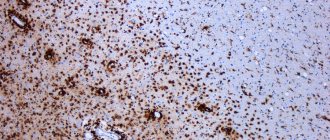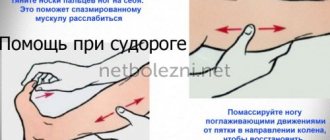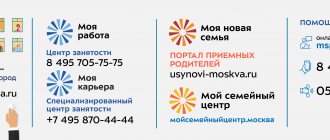Autism in adults
The symptoms of autism do not diminish with age, and the quality of life of a person with this disease depends on the level of his skills. Difficulties with social adaptation and other signs characteristic of this disease provoke great difficulties in all aspects of the adult life of an autistic person.
Symptoms vary widely in adults. Everything is determined by the form of the disease. With mild autism and normal mental abilities and communication skills with other people, at the age of 20-25 a person is able to provide for himself independently, having only partial dependence on his parents. In fact, only a third of autistic adults are able to live outside the control of their parents. In a more severe form of autism, a person constantly needs observation and care from the people around him, especially if he does not speak and his intelligence is below average.
The results of research by British scientists have confirmed that autism in adults occurs to one degree or another in one in a hundred people.
In autism, social interaction with people is completely or partially impaired, and adaptive social abilities are extremely low.
Symptoms of autism in adults typically include:
External and internal.
Autistic adults have poor gestures and facial expressions.
Elementary rules of communication are not understood or ignored:
- look too closely into the eyes of the interlocutor, or avoid eye contact altogether;
- may come too close to the interlocutor, or move away from him at a very large distance;
- may speak too loudly or, on the contrary, barely audible;
- they do not understand the emotions, intentions, and feelings of other people; they associate a person with an inanimate object;
- do not realize that their behavior can offend someone;
- they are virtually incapable of friendships or romantic relationships due to their lack of social knowledge. They see and hear about love, but it is difficult for them to feel and understand this heartfelt inclination, since many with autism do not have attachment to a loved one, much less to a stranger;
- They do not feel romantic gestures, they consider kisses useless. For autistic people, hugging is an incomprehensible attempt by someone to limit their movements. They are not alien to sexual feelings, but there is no one to discuss them with. So they get their courtship information from TV movies. Autistic men behave like smug machos or conquerors of women's hearts, and after watching pornographic films, they sometimes act like rapists. Autistic girls imitate heroines of soap operas, whose behavior contradicts reality, through which they become victims of violence;
- find it difficult to be the first to start a conversation with someone;
- have a very poor vocabulary, often repeat certain memorized phrases;
- the speech of an adult autistic person without intonation is similar to the speech of a “cyborg”;
- in ordinary situations of the same type they feel and behave confidently and calmly;
- react to any change in life and are very worried if something has changed;
- have a limited set of interests, a greater predisposition to established objects, habits, and specific places. Any change in the usual environment unbalances or greatly frightens;
When diagnosed with autism, symptoms in adults affect many aspects of the everyday and social behavior of such patients. They are predisposed to repeat the same actions every day and persistently perform the most precise rituals in everyday life. Autistic people always dress in a strictly specific sequence and only in familiar clothes; in a strictly ordered form, they distribute things and objects throughout the home and in their room according to their own understanding.
Autistic adults like to perform the same type of movements for a long time, devoid of any practical purpose. They are not interested in the affairs of close people, events that happen in the world around them, but any change in their usual way of life causes a lot of unrest.
People with autism are very talented and endowed with a wealth of valuable knowledge. Through the inability to communicate and correctly present important information, they leave their genius within themselves.
The manifestation of autism in adults, according to statistical studies, shows that with early detection of the disease and timely rehabilitation, more than 50% of autistic people participate in a socially active lifestyle and manage without the supervision of parents and relatives.
A mild form of autism even provides an opportunity to get a job performing the same type of activity without professionally qualified training. However, it is rare that the intelligence of an autistic adult does not exceed 50%, and the vocabulary is at the level of a five-year-old child. But even such results are considered a victory. But there are many examples where adults with autism are completely helpless, they have no self-care skills, and they require constant parental care.
Personal life. Relationships with the opposite sex are an area that causes great difficulties for autistic people. Romantic courtship is unusual for autistic people, as they do not see the point in it. They perceive kisses as useless movements, and hugs as an attempt to limit movement. At the same time, they may experience sexual desire, but most often they are left alone with their feelings, since they are not mutual. Without friends, autistic adults get a lot of their information about romantic relationships from movies. Men, having watched enough pornographic films, try to put such knowledge into practice, which frightens and repels their partners. Women with autistic disorders are informed more by TV series and, due to their naivety, often become victims of sexual violence. According to statistics, people with autism spectrum disorders are much less likely than others to create full-fledged families. It should be noted that recently the opportunities for an autistic adult to arrange his personal life have increased significantly. With the development of the Internet, various specialized forums began to appear where a person diagnosed with autism can find a partner with a similar disorder. Information technologies that make it possible to establish contact through correspondence are helping many autistic people meet and develop friendships or personal relationships with others like themselves.
Professional activity. The development of computer technology has significantly increased the opportunities for professional self-realization of autistic people. One solution that is popular is remote work. Many patients with this disease have an intelligence level that allows them to cope with tasks of a high degree of complexity. Not having to leave their comfort zone and interact face-to-face with work colleagues allows autistic adults not only to work, but also to develop professionally. If skills or circumstances do not allow remote work via the Internet, then standard forms of activity (work in an office, store, factory) cause great difficulties for an autistic person. Most often, their professional success is significantly lower than their real abilities. Such people achieve the greatest success in those areas where increased attention to detail is required.
Life conditions. Depending on the form of the disease, some autistic adults can live independently in their own apartment or house. If the patient underwent appropriate correctional therapy in childhood, then as an adult he can cope with everyday tasks without assistance. But most often, autistic adults need the support they receive from their relatives, loved ones, and medical or social service workers. Depending on the form of the disease, an autistic person may receive financial benefits, information about which should be obtained from the relevant authority. In many economically developed countries there are homes for autistic people, where special conditions have been created for their comfortable living. In most cases, such houses are not only housing, but also a place of work. For example, in Luxembourg, residents of such houses make postcards and souvenirs and grow vegetables.
Social Communities Many autistic adults hold the view that autism is not a disease, but a unique life concept and therefore does not require treatment. To protect their rights and improve their quality of life, autistic people unite in various social groups. In 1996, an online community was formed called NIAS (Independent Living on the Autism Spectrum).
Risk factors
Autism spectrum disorder, or autism, the symptoms of which depend on the patient's health, progresses more quickly if the following risk factors are present:
- viral disease (flu);
- intoxication;
- fever;
- antibiotic therapy;
- immune system disorders;
- poisoning
Among the reasons why autism develops in children, the symptoms of which are somewhat different from the symptoms of pathology in adults, doctors call:
- problematic or difficult childbirth;
- taking medications by a pregnant woman;
- infection during pregnancy;
- asthma, hyperemia, obesity or exhaustion of the mother during pregnancy.
Asperger's syndrome
Children with Asperger's syndrome are the mildest of the autism spectrum disorders, in part because the symptoms are more manageable and these children usually have an excellent prognosis for the future with the help of ongoing and correct correction methods. They often do not have significant language delays compared to others on the spectrum, but they also have difficulties with socialization and communication.
The following are examples of behaviors that are closely associated with Asperger's syndrome:
- Limited or inadequate social interactions
- Repeated speech, speech looks rote and monotonous, like a robot
- Problems with nonverbal communication (gestures, facial expressions, etc.)
- Tendency to discuss oneself rather than others
- Inability to understand social and emotional problems
- Lack of eye contact during mutual conversation
- Obsession with specific, often unusual topics
- Conversations are often one-sided
- Awkward movements or mannerisms
Due to the absence of obvious signs of autism, this syndrome is difficult to notice until the child begins to attend kindergarten, school and other public places.
Often the symptoms of this syndrome are confused with other behavioral problems such as attention deficit hyperactivity disorder (ADHD).
Another common trait of Asperger's is the inability to understand another person's intentions, actions, words and behavior. They don't understand humor, satire, allusions, etc. In addition, children with this syndrome cannot instinctively respond to “universal” nonverbal cues such as smiling, frowning, etc.
Some people with Asperger's syndrome have a peculiar way of speaking: excessively loud, monotone, or with an unusual intonation. Aspergers have difficulty managing their emotions. They may cry or laugh at inappropriate times.
As a rule, “Aspergers” at first glance are not much different from ordinary children. They are just slightly different children, they can be called artsy communicators, children with good verbalization, they are called children with high functioning autism. The world is already thinking about removing Asperger's syndrome from the general autism spectrum
Treatment
Treatment of autism in adults involves the use of various techniques. The disease autism responds well to treatment with therapeutic methods, the goal of which is to create internal balance and reduce stress levels.
Drug treatment for autism is prescribed in cases where the patient’s condition requires correction, and includes a number of drugs:
- tranquilizers, antidepressants, antipsychotics, nootropics;
- anticonvulsants;
- stimulants.
In the case of autism, psychological therapy, with the correct choice of methodology, can significantly improve the patient’s adaptation to society. People with autism successfully cope with the disease if they seek help in a timely manner.
Diagnostics
To make a diagnosis, 2 diagnostic systems are used:
- First system . Diagnostic and statistical manual presented by the American Psychiatric Association. Version 4 of DSM-I is available today. Detailed recommendations contain the ICD-10 criteria, especially in the research version, which is used by most European doctors.
- Second system . Today, the relatively simple CARS observation scale is most often used. (CARS) Autism is assessed with 15 items. The actual examination lasts about 20-30 minutes, the total time (including assessment) is 30-60 minutes. Primary attention is paid to major and minor clinical manifestations.
First-hand life stories
The stories of autistic people serve as a kind of “manual” for healthy people, helping them understand the life of a person with ASD.
My family accepted me for who I was. All 3 sisters (including me) were neurotic in their own way, so our parents did not compare us to anyone. As children we read, drew...
No one thought it strange that we spent our days in our rooms, in the forest, on the river, with horses, and other animals.
I sometimes ignored my surroundings, focusing on one thing. But we laughed about it. No one ever punished me or told me about the need for changes.
Everything changed at school. “You have to try harder... You have to do it better...” Mom was on my side. When there was an oversaturation of stimuli (this was often), she left me to read at home and did not demand communication. Now, looking through old diaries, I see that the gaps were up to 45 days.
Emma, 27 years old
Boundaries have always been a problem for me, mainly because I can't figure out where they are. This leads to misunderstandings and social breakdowns. Either I don't talk at all or I talk too much.
Alisa, 35 years old
How does a person with ASD feel? A healthy person will not feel this, but can understand from the following stories.
My problems didn't come to the surface until I started school. The classroom was a crazy place: fluorescent lights, noise, work that was either too hard or ridiculously easy. School was sort of a combination of anxiety and boredom. I was a polyglot, I read in 2 languages. But mathematics was a dark forest for me. The teachers didn't understand this. I gave up and my behavior worsened. After leaving school at 15, I joined a cult and was interested in witchcraft...
Inga, 30 years old
I often realize that I am behaving inappropriately, but I cannot discern the reactions of others. I take jokes literally, seriously, and engage in a defensive reaction, often disproportionate... I feel insecure in social situations. Meeting a man in the cafeteria whom I once greeted at a kiosk, I don't know whether I should greet him going to lunch with female colleagues. I'm afraid to seem provocative. That's why I prefer not to look at them.
Alexander, 40 years old
Causes, symptoms and signs of the disease
Autism entails a delay in the patient’s full mental development. More often than not, these children do worse than their peers at school. The disease affects the ability of an autistic child to concentrate and remember learned material.
Profound mental retardation is possible in those children whose autism was caused by other severe diseases of the brain or nervous system. The main feature of autism is selective intelligence. The fact is that some autistic people may excel in music or art, but fall significantly behind in other subjects. An example of this would be some famous figures in history who made significant contributions to science, such as Albert Einstein, who was also autistic.
It is impossible to determine externally whether a child has a disease such as autism. The exact causes of such a disorder of the nervous system are not fully known, but several main provoking factors have been named:
- Obesity and other maternal metabolic disorders.
- Cerebral palsy.
- Oxygen starvation of a child during pregnancy or childbirth.
- Infectious diseases that the mother suffered while pregnant.
- Hereditary predisposition.
Making an accurate diagnosis is possible only after a complete examination of the child. It is possible to suspect early autism if you pay attention to the child’s behavioral characteristics. Pathology is possible under the following conditions:
- the child likes to play alone and does not show a desire to communicate with others;
- cannot tolerate loud noises;
- shows nervousness when touched by others;
- always looks away when adults talk to him;
- is more often silent, does not know how to clearly explain what he wants;
- throws frequent tantrums;
- the child lacks the instinct of self-preservation.
In addition, early autism can be suspected in a passive or hyperactive child if there are additional signs of the disease listed above.










